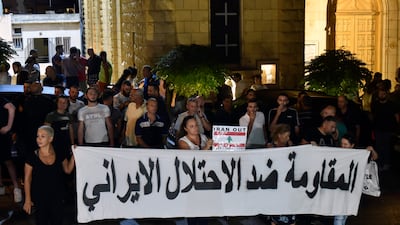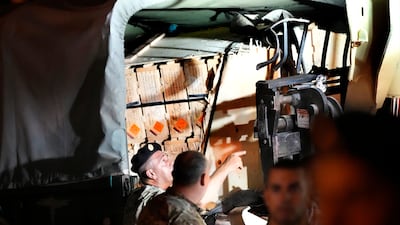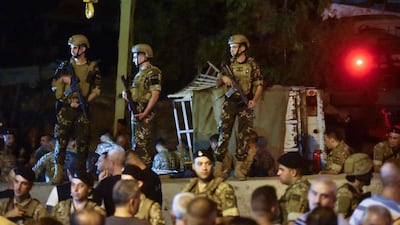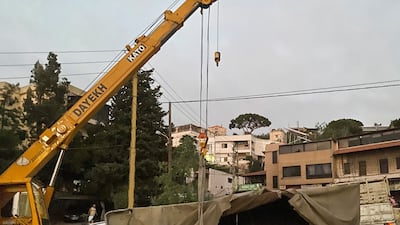A very serious incident occurred last week, when a Hezbollah truck transporting weapons to Beirut turned over in the nearby Christian village of Kahaleh. What the episode showed, above all, is that while Hezbollah remains powerful militarily, its cross-communal support in Lebanese society no longer exists.
While the sequence of events is not absolutely clear, armed Hezbollah members accompanying the truck tried to force villagers away once the vehicle had turned over. When the villagers realised the truck was carrying weapons, they began throwing rocks at the armed men. One villager, Fadi Bejjani, started firing on them, killing one of the Hezbollah members, before his comrades shot and killed Bejjani.
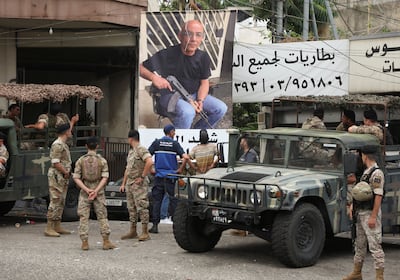
To many people in the Christian community, this is the third time that Hezbollah has done them harm in the past three years. Christians hold the party responsible for the ammonium nitrate explosion at Beirut port in August 2020, which destroyed large swathes of Beirut, mostly Christian-majority quarters. Hezbollah is suspected of having stored the material.
Just over a year later, in October 2021, armed demonstrators from Hezbollah and the allied Amal movement entered the Christian neighbourhood of Tayyouneh as part of their protest against an investigation of the port explosion. The investigator, Tarek Bitar, had displayed courage in pursuing his inquiry, and Hezbollah and Amal sought to show that if he was allowed to continue, this might provoke conflict with Christians.
The problem is that the young men in Tayyouneh began firing on the demonstrators, killing at least one of them. Later on, several more were killed by snipers, widely believed to belong to the Lebanese army. The army never acknowledged this, but off the record military personnel stated they had averted a serious sectarian clash.
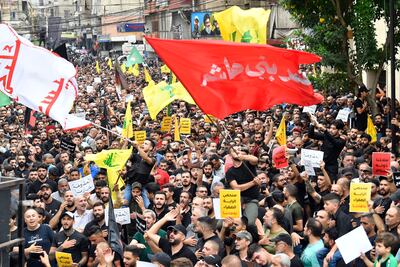
Kahaleh completed this triptych. Hezbollah, which tried so hard to secure Christian support in 2005 and divide its enemies after the departure of the Syrian army from Lebanon, by allying with the Free Patriotic Movement (FPM) of Michel Aoun, must realise its strategy has failed. Mr Bejjani appears to have been an Aounist, while FPM members are as outraged by what happened in Kahaleh as other Christians are.
Little is likely to change Hezbollah’s behaviour. The party will continue to act as a state within a state and hijack national decision-making on behalf of its sponsor Iran. However, it should be careful. Some of the directions it is taking today cannot possibly succeed without broad and solid backing within Lebanese society.
Earlier this year, for example, Hezbollah’s secretary general, Hassan Nasrallah, supported what he called the “unity of the fronts” against Israel. What this meant is that Hezbollah would work with Palestinian organisations such as Hamas and Islamic Jihad to create a situation in which Israel could face co-ordinated attacks from Gaza, the West Bank, Lebanon and Syria in response to Israeli military operations.
The hitch is that this is highly controversial, even within Lebanon’s Shiite community. Many Shiites recall the heavy price they paid in the late 1960s and 1970s when Palestinian guerrillas attacked Israel from southern Lebanon. For Hezbollah to again tie the south’s security to the Palestinian-Israeli conflict is risky, even more so if it is strongly rejected by other Lebanese sects.
The reason is simple. In the event of a new war, Israel will provoke major destruction in Lebanon, Shiite areas in particular. This will displace hundreds of thousands from the community. While during the war of 2006 the Shiite displaced were hosted in non-Shiite areas, given sectarian polarisation today, the reaction from the other communities may be much less tolerant.
Two things may happen as a result of a war with Israel. The destruction in Shiite areas could turn many in the community against the party, while the anger of other communities against Hezbollah could cast doubt on the durability of the Lebanese communal contract. Already, there is a strong secessionist mood among Christians because of Hezbollah’s hegemony. A war could push this to the point of no return.
Either of those outcomes – Shiite resentment of the party or the break-up of Lebanon – would pose a major challenge to Hezbollah. Already today, without a national consensus behind what Hezbollah calls “the resistance”, the party is operating on shifting sands, which limits its options when it comes to Israel.
Yet Iran is perturbed by Arab normalisation with the Israelis. This represents a strategic threat to Tehran regionally, and its mobilisation of Hezbollah and Palestinian organisations against this trend is an attempt to retain leverage over the process.
More importantly, Hezbollah is thinking ambitiously. The sectarian pushback at home appears to have led the party to try reshaping the disintegrating Lebanese order – a result of the financial collapse of 2019 – around its interests. This reflects hubris. As Hezbollah imposes its way, Lebanon’s other communities will increasingly resist whatever the party initiates.
Hezbollah has never respected Lebanon’s treacherous sectarian system, even if ignoring it has cost other communities in the past – notably, the Maronite Christians and Sunnis. Trying to push the country in directions it does not want to go will only exacerbate existential fears among minorities – and every community in Lebanon is a minority – prompting them to defend themselves.
For Hezbollah, a civil war would be fatal, burying it in a destructive conflict that would soon draw in regional actors. Hezbollah has broken the wall of consensus once protecting it, and is operating without a net. This can lead in unpredictable directions.


